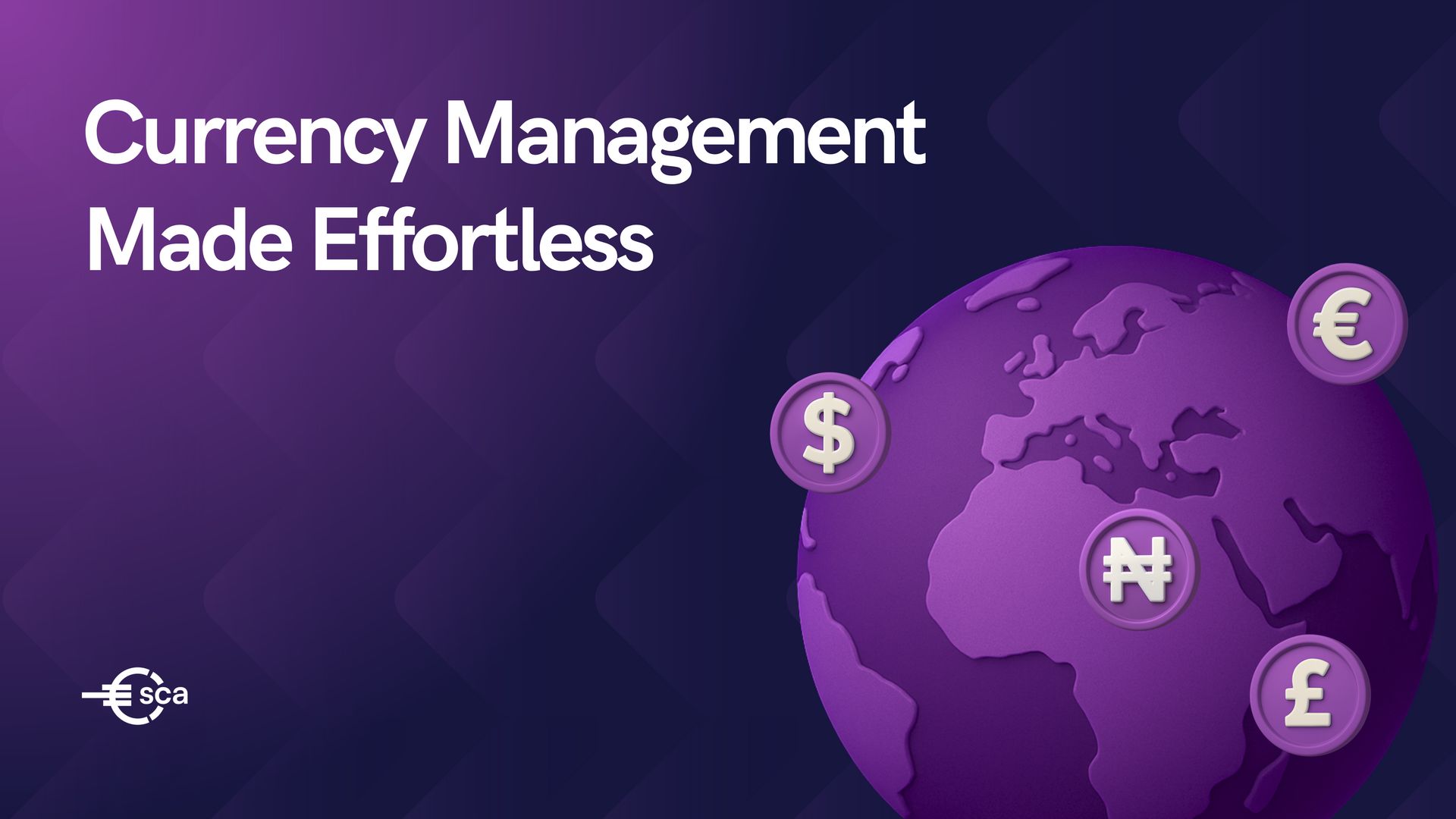- Tech Safari
- Posts
- Vice Dot Com
Vice Dot Com
Inside Africa’s big online vice economy
Hey, Sheriff here 👋
There’s a lot of talk about how hard it is to get consumers to pay for tech products in Africa.
But did you know that back in 2018, Nigerians spent $2 billion a year on sports betting sites?
In this week’s edition, we’ll be diving into Africa’s online vice economy, its sheer size, and what powers it.
But first, we have an announcement.

Get Effortless Currency Management On a Global Scale
Currency management can be the difference between profit and loss.
Esca gives your business the tools to manage currency needs anywhere in the world. Instantly access multi-currency bank accounts with automatic conversions, cross-border payments, and derivatives to hedge FX risk.
Protect your margins, repatriate revenue, and operate globally; all without switching tabs.
Now, on to this week’s story….

There’s a website in Africa that’s just like OnlyFans.
It’s called AllAccess.
It’s barely a year old, but it already has over 110,000 users and has paid out $1 million to creators.
Like OnlyFans, it’s touted as a way for creators to make money off their content.
In reality, it’s mostly for sharing porn.
But AllAccess is not the only adult site in Africa.
In fact, its success is a stark reminder that Africa has two kinds of internet.
One is mainstream: a booming startup scene, venture capital, and global remote work.
The other is much darker, with vices like sports betting, adult content, and predatory loans.
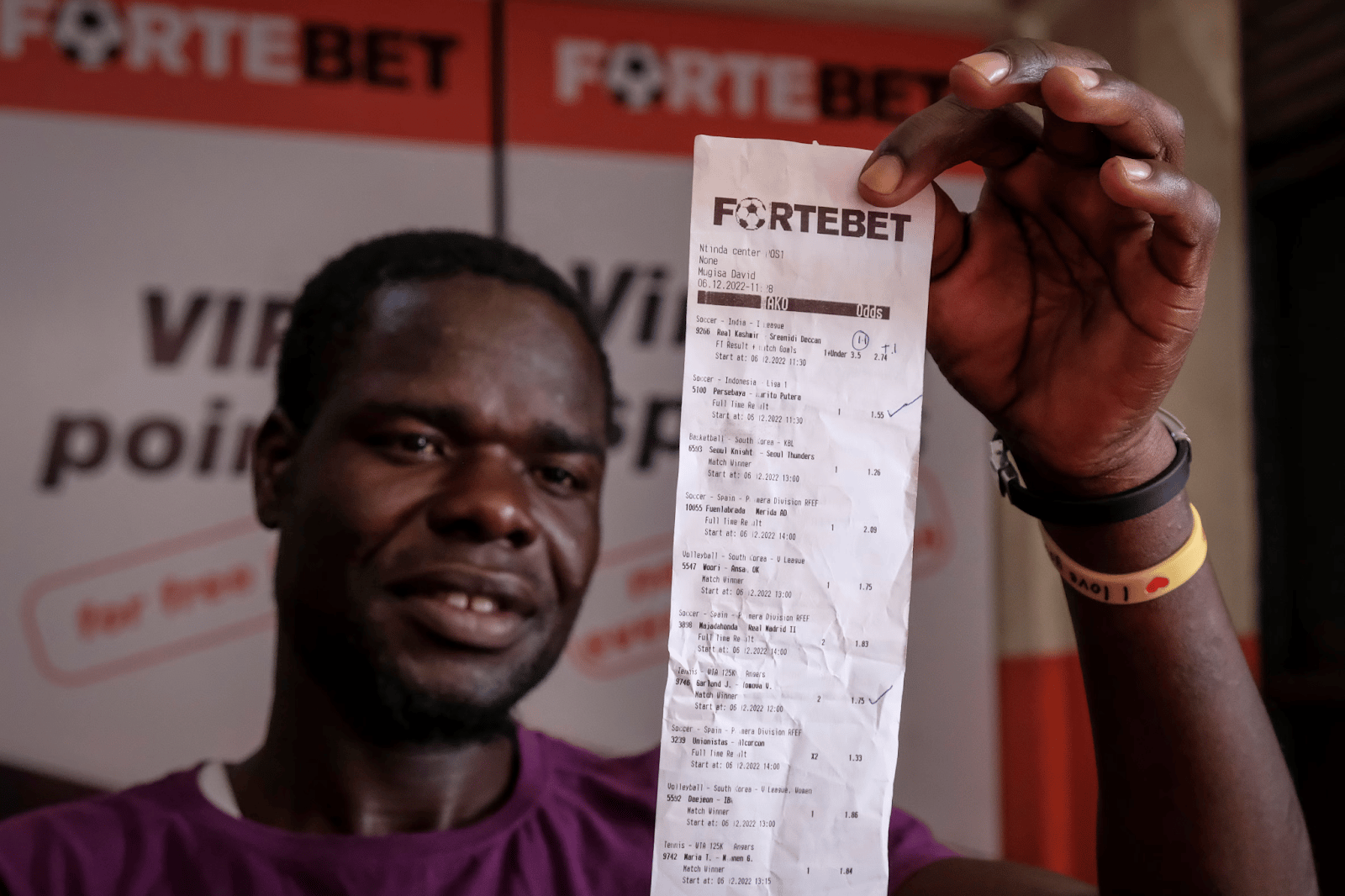
Most of these vices are branded as entertainment, but they’re really addiction hatches.
And while the mainstream internet grabs the headlines, the darker side is more popular in reality.
These vices are everywhere, on social media, in group chats, on billboards, and even on the street corner.
And as millions of young Africans come online in search of opportunity, they’re more likely to find it first.
Sometimes, that makes all the difference between opportunity and decadence.
But what really goes on on this side of Africa’s internet?
Strap in, let’s explore…
Africa’s online vice economy
The popular narrative is that startups were the first things to blow up on Africa’s internet space.
That’s the wrong story.
The first thing to blow up was sports betting.
In 2009, Akin Alabi started NairaBET in Nigeria.
It’s a website where anyone can place bets on football games.
It was built on something all Nigerians desperately wanted: a big win.
In one night, over 200 users had signed up.
In a year, it’d processed ₦100 million ($300,000 in 2009) in bets.
And within a decade, it grew into a $100 million company, without ever raising venture capital.
But the important part isn’t just that it grew, it’s how.
See, NairaBET had a hybrid model.
In addition to a website, it had a network of walk-in shops where agents could place bets for customers.
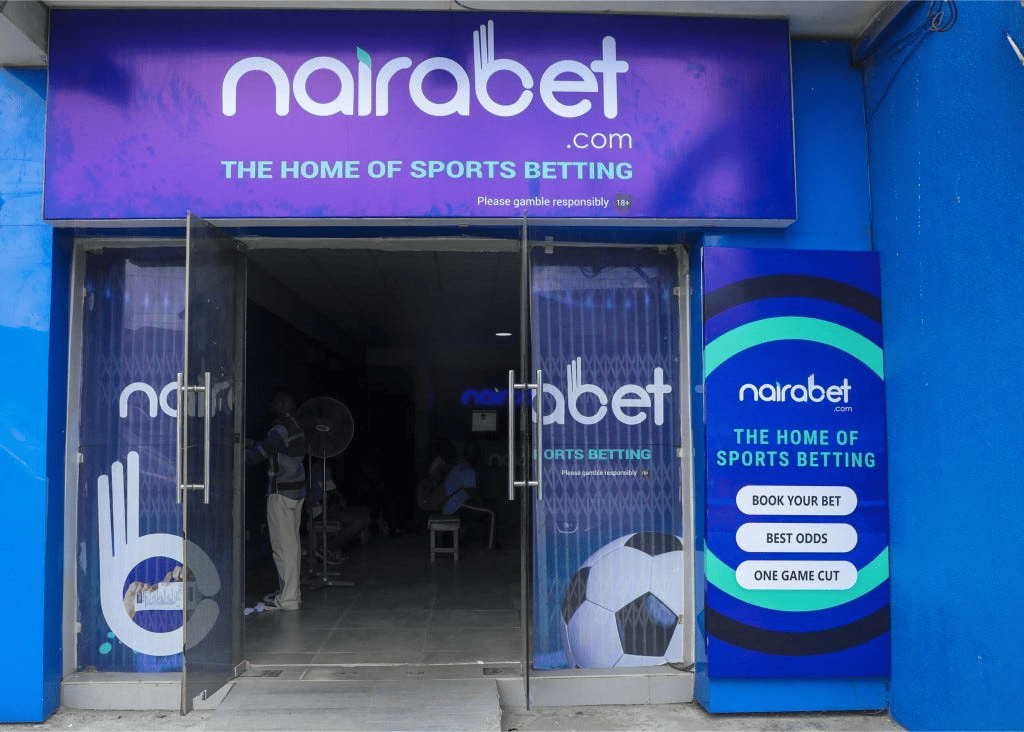
Today, there are thousands of shops just like this across Africa, where anyone can walk in and place a bet
For people who didn’t know how to use computers and the internet, this was perfect.
Anyone could walk in and place a bet, including teenagers who hadn’t finished high school.
And because smartphones weren’t as common back then as they are today, these betting shops were many people’s first intro to the internet.
Today, over 50 betting companies operate in Nigeria, with only a few of them enforcing age controls.
And they make big bucks.
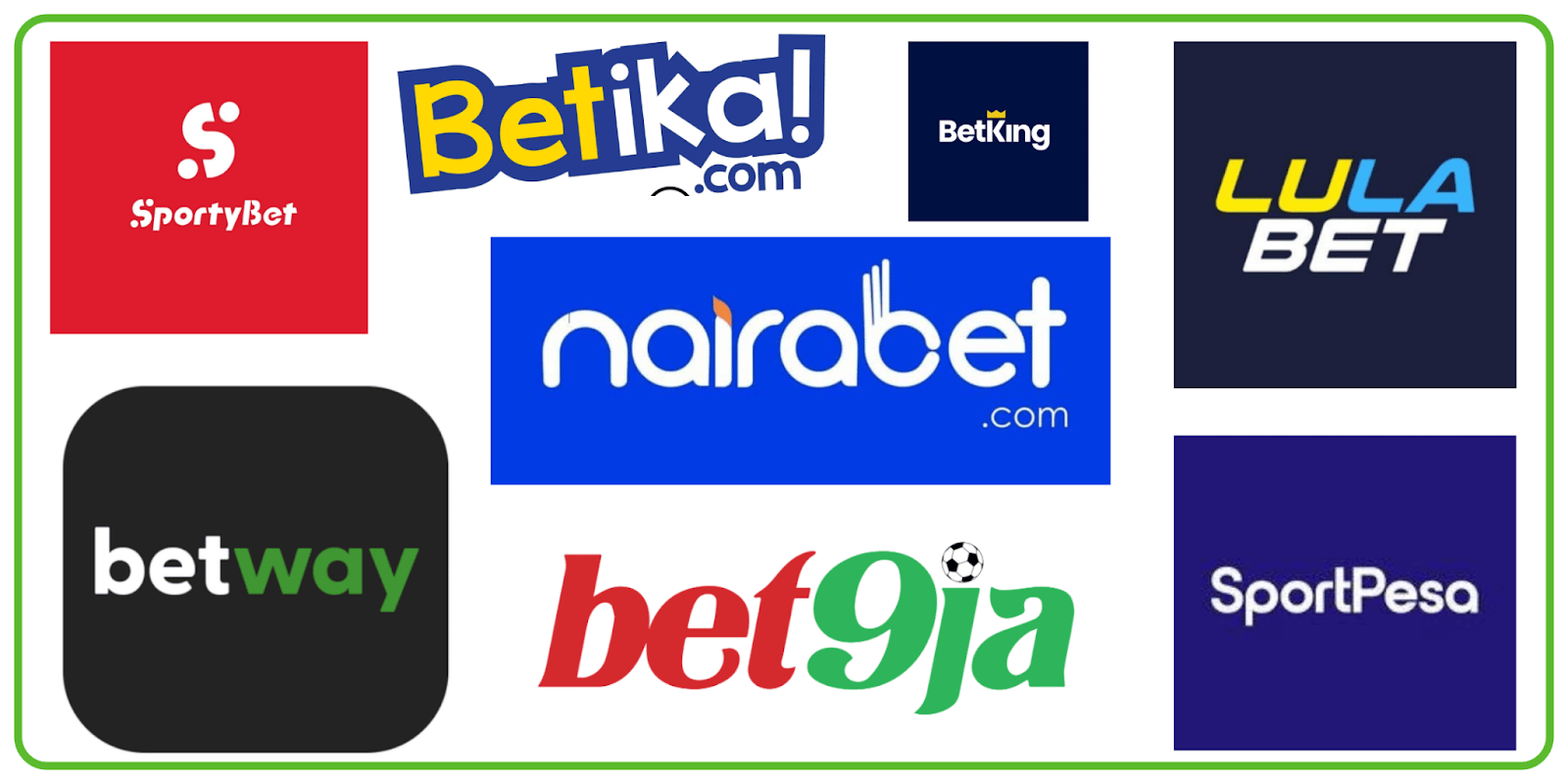
If you walk around any African city, you’re more likely to see stickers of these companies than any mainstream startup.
A 2018 study found that Nigerians spent $55 million a day placing bets, making sports betting a $2 billion industry in Nigeria.
And over 60 million Nigerians bet around $15 every month.
Most of these people were low to middle-income earners.
But it’s not limited to Nigeria.
In Kenya, 79% of adults are active bettors.
In South Africa, it’s a $800 million market.
One Geopoll study found that six out of ten African bettors were students or unemployed.
And the average monthly spend on bets was $50.
That’s a large chunk of the average African’s wallet going towards a “bad habit”.
But gambling is not Africa’s only internet vice.
In fact, when you look under the hood, vices make up a large part of Africa’s internet traffic.
Vice dot com
Let’s play a game called Africa’s Internet Traffic.
Can you guess the top ten most visited sites in Nigeria, Kenya, and Egypt?
Let’s check our answers.
In Nigeria, 4 of the top 10 spots on the lists are either betting or porn sites.
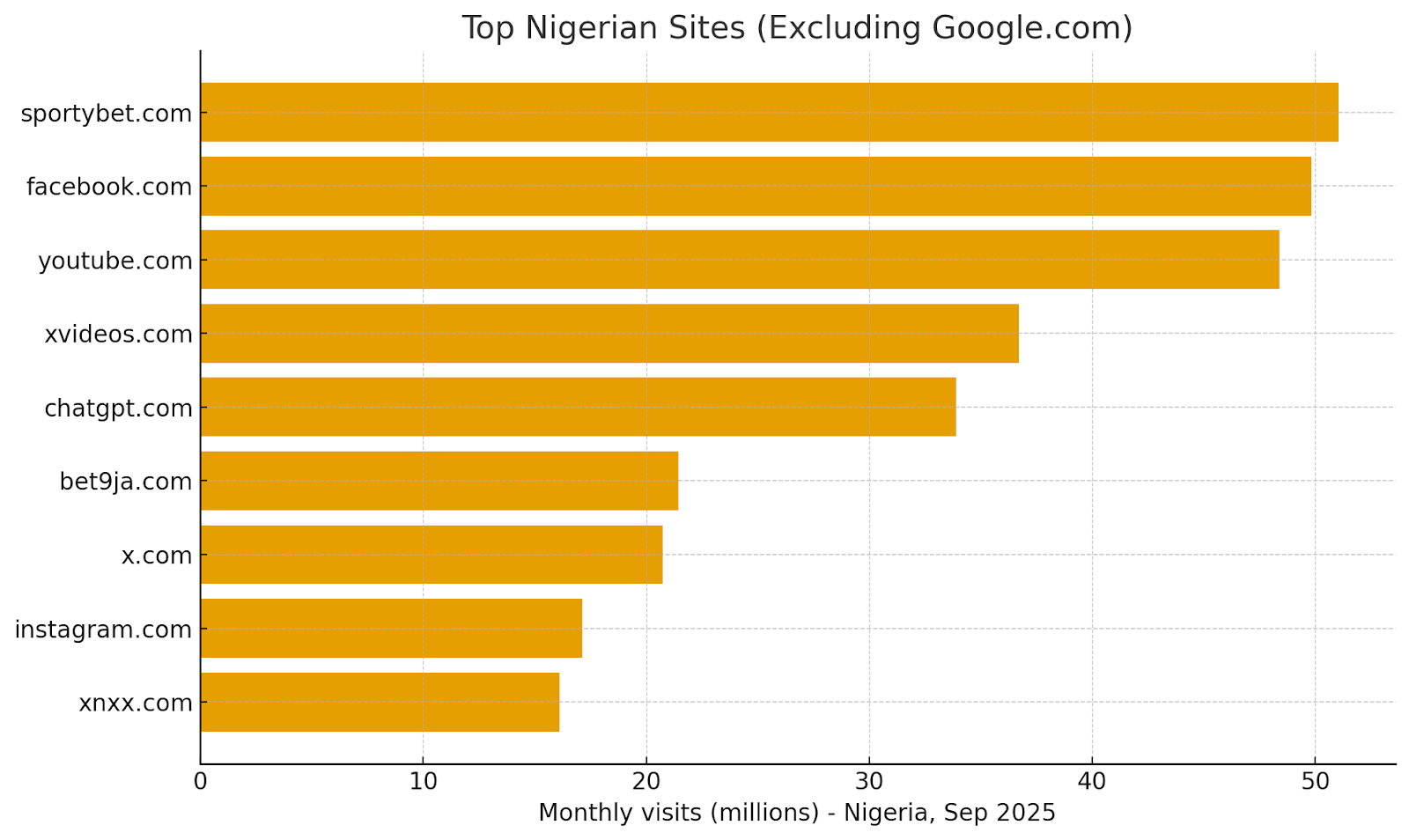
Besides Google, porn sites and betting sites dominate the list of most visited websites in many African countries
In Kenya, there's one betting site and one porn site at the 4th and 8th spots.
And in Egypt, where betting is basically illegal and socially taboo, porn sites still take the 4th, 5th, and 8th spots.
But it gets even murkier when you step off the websites and into social media.
Apps like Telegram are popular for groups where adult content is shared for a fee.
There, betting “gurus” also offer guaranteed odds for gamblers to be on.
Universe I dropped it here!
Telegram:t.me/thirty9bilns
— 39 (@39billion)
10:02 AM • Oct 29, 2025
Content creators on AllAccess also use X and Instagram to drive people to their sites.
On Africa’s internet, these online casinos and strip clubs exist side-by-side with software bootcamps.
On their own, these things wouldn’t matter, but in Africa, it does, because the continent is...
The youngest population on earth
Globally, online vices are nothing new.
Porn basically built the early internet. (Let’s not act brand new).
But in Africa, it’s a bigger deal, because of one number: 19.
That’s the median age in Africa. We’re the youngest population on Earth.
And the fastest-growing user base of the mobile internet.
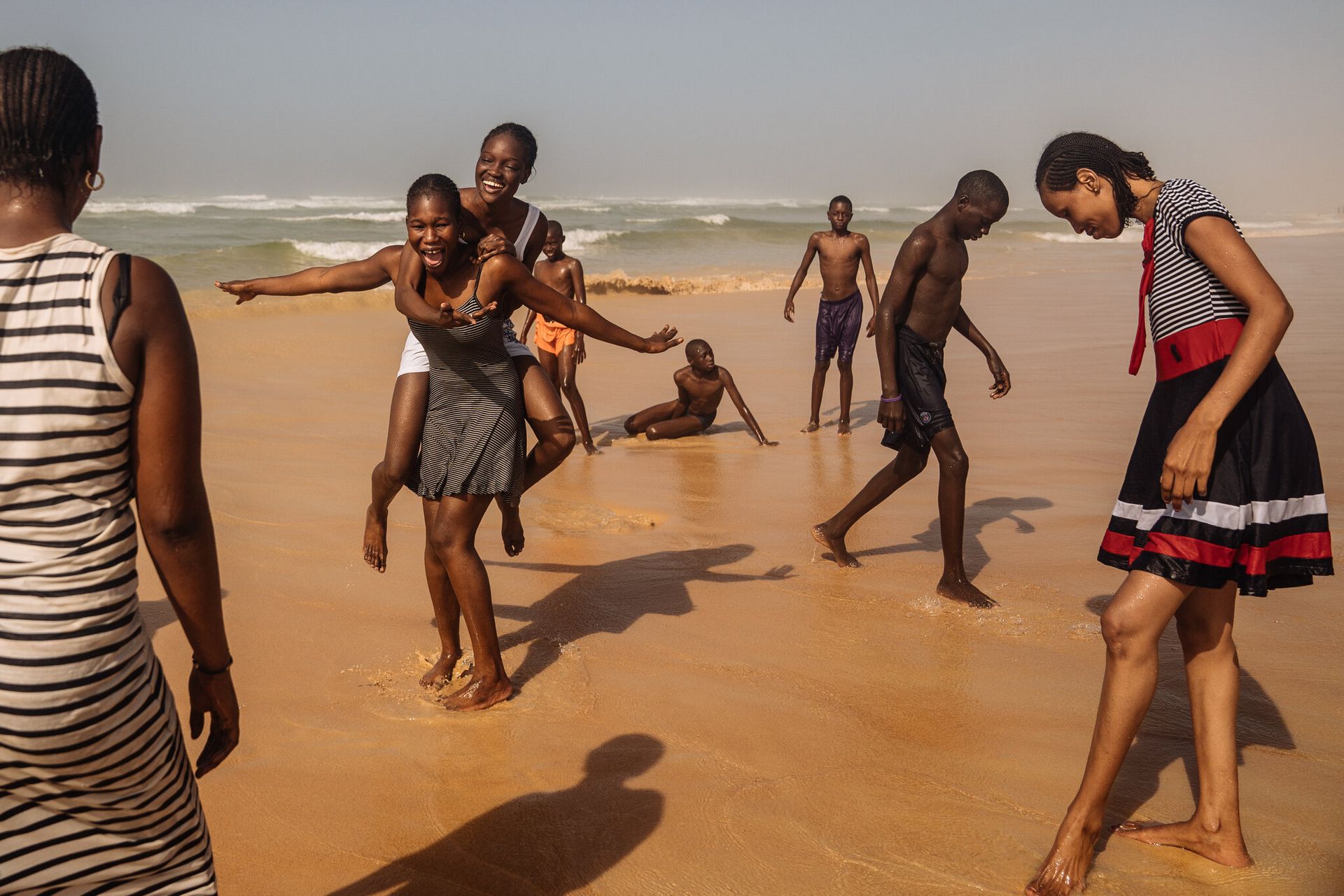
Tens of millions of teenagers, digital natives, curious minds, unstable hormones, are entering the web without guidance, filters, or brakes.
The internet they meet isn’t only full of learning and economic opportunities.
It’s also full of sexual clickbait, cash-outs, and quick dopamine loops.
And herein lies the paradox.
There’s no denying that a massive opportunity has been created for young people by the internet in Africa.
There’s a fast-growing creator economy, a teeming remote workforce, and a strong startup ecosystem.
But the same pipeline that delivers opportunity also delivers harm.
The same teen who’s learning to edit videos for TikTok might also be gambling half his allowance on Bet9ja.
The same smartphone used to learn graphic design might also host three loan apps with pending repayments.
The stakes are real here.
Porn addiction has been shown to destroy focus.
Debt kills productivity.
And a gambling habit is the surest way to stay poor.
For a generation trying to “catch up” with the world economically, these vices are lethal.
But the internet doesn’t discriminate. It gives everyone equal access…to everything.
So the path from curiosity to chaos is short when there’s no parental supervision, no safety infrastructure, and no guidance.
And in case you’re wondering what this edition is all about…it’s safety.
The fork in the road
There are only two routes from here:
1. The control route
Governments step in. They ban, tax, and block access.
Kenya already tried this, shutting SportPesa temporarily in 2019.
Nigeria routinely blocks loan apps and unlicensed betting sites.
The upside: fewer harmful sites.
The downside: lost revenue, black markets, VPNs, and deeper underground networks.
You can’t ban human nature. You just relocated it.
But what if there’s a better way?
2. The safety route
Instead of bans, we can build better guardrails.
That means enforcing age verification, setting deposit limits, and introducing parental controls.
It also means promoting digital literacy, teaching people how to navigate online safely.
Groups like Paradigm Initiative and SafeOnline Africa are already pushing digital-safety programs across schools.
And Gonline Africa is running digital literacy programs in rural and marginalised communities in Africa, making sure they discover the safer side of the web first.
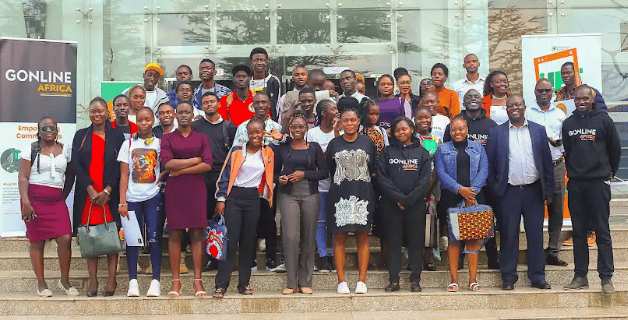
Gonline Africa is driving the trend in the opposite direction, helping more young entrants to the internet learn about the internet safely
Startups like GoGuardian are building parental-control tools for local markets.
And regulators in South Africa are rolling out frameworks for responsible gambling and loan transparency.
It’s not sexy work. But it’s essential to the safe growth of Africa’s tech opportunity.
Because Africa’s digital story is…
A tale of two internets
Internet safety might just be the most under-discussed but most urgent issue in African consumer tech today.
The good apps (education, remote work, fintech) exist side-by-side with harmful ones (porn, betting, shady loans).
So while it’s great to cheer on internet penetration, a better metric might be time well spent online.
Because if Africa’s internet becomes more about betting odds and sex than about skills and wealth creation, we’ve built a dopamine economy.
We can build the future of digital Africa on education, opportunity, and creativity.
But it requires taking a safety-first view of the internet.
How do you think Africa can make its internet safer?
Let me know.

Tech Safari Mixer - Cape Town 🇿🇦
Hey 👋🏾
We're back in Cape Town on Wednesday, November 12th for another Tech Safari Community Mixer!
If you are a founder, operator, investor, or creator in South Africa's tech ecosystem, join us for a night of:
🎤 Punchy discussions with leaders in Africa's tech space
🤝 Networking and connections
🍿 Great food and drink
✨ A few surprises
Speakers to be announced soon (and trust us, you won't want to miss this lineup 👀)
🎟️ Tickets are capped – Early bird tickets sold out in days, and we're down to the last set of regular tickets at a higher price point. Don't miss out!
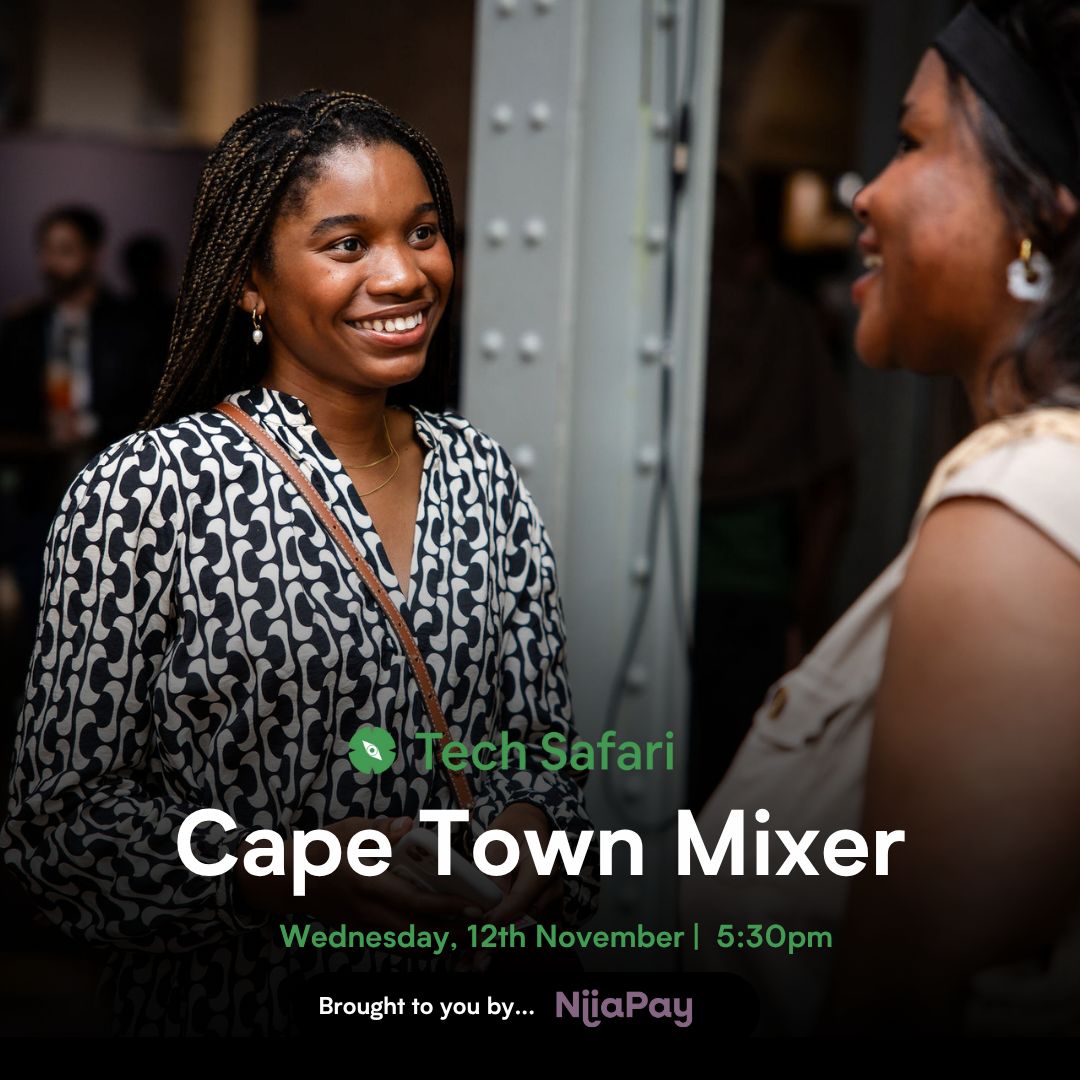

That’s it for this week. See you on Sunday for a breakdown on This Week in African Tech.
Cheers,
The Tech Safari Team
PS. refer five readers and you’ll get access to our private community. 👇🏾

What'd you think of today's edition? |

Wow, still here?
You must really like the newsletter. Come hang out. 👇🏾
